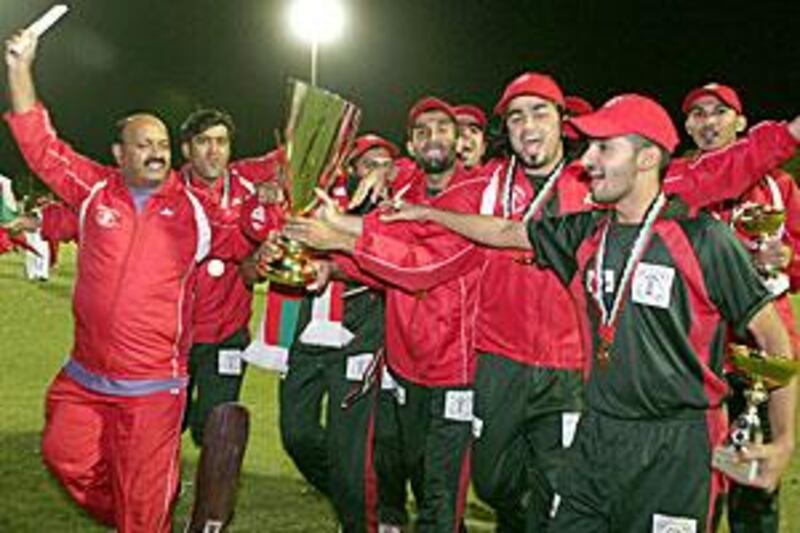DUBAI // The Emirati cricketers representing the UAE may have sacrificed a little in terms of local bragging rights to their neighbours from Oman when they gave up the newly minted Gulf Cup late on Tuesday night. If they were disappointed after a 55-run loss in the final, it was hard to tell. The first cricket competition exclusively for Arab nationals had been a shared triumph, and the two groups of players celebrated together on the square at the Dubai Aluminium ground as if they had just won the World Cup.
Rarely, if ever, has such an outpouring of national pride been seen on a cricket field in the UAE. It was more reminiscent of football, from the red, green, black and white confetti to the flag-waving supporters - even if they were small in number. Proof, if ever it were needed, that the sport is not the sole preserve of expatriates. The day before, the UAE's official and expatriate-heavy national team had been equally soundly beaten in the final of the ACC Trophy Twenty20 by Afghanistan.
The Afghans are certain to continue their ascent from Peshawari refugee camps, where the game first took root following the Soviet invasion of their homeland, by playing at the Asian Games in China next year. They have already secured full one-day international status and, crucially, their entire team are eligible to play in Guangzhou. By contrast, their opposition at the Zayed Stadium on Monday had just two UAE passport holders, who would qualify to go the Games, in their number.
Yet the Emirati cricket contingent in the UAE remain intent on playing in China. When they read, on the ACC website, that Oman were planning to send a side to the inaugural Asian Games cricket competition, they wanted a piece of the action. Hence the hastily arranged Gulf Cup, which was put together by the UAE captain Alawi Shukri within the space of two months, in order to give Emiratis experience of international competition.
They were cheered to hear that the country's governing body, the Emirates Cricket Board - whose assistance in staging the competition they did not seek and who they acted independently from - had been monitoring their progress. However, they were less than enamoured with the comments of Syed Ashraful Haq, the chief executive of the ACC, who suggested their presence would "undermine the tournament" and "jeopardise our chances of taking the game forward".
Haq's words provoked an angry response from the Emirati team manager, Abdulrazzaq Kazim. The irate former national team coach issued a statement reminding the Bangladeshi cricket administrator of his own nation's struggles before they were granted full Test status. He also recounted the days, just over a decade ago, when the UAE competed on an even footing with them. "How can you comment on the UAE team?" wrote Kazim. "Not one day did you come to witness our matches, nor do you know our boys. Where are you? I advise you should go and encourage rather than commenting ignorantly."
Had Haq seen the standard of play on show at Dubai, he may not have changed his view on the Emiratis' skill level, but this was not the best available side. The two Emirati players from the official national team, Fahad al Hashmi and the long-serving Mohammed Tauqir, would jump at the chance of leading their emerging compatriots in Guangzhou. Both have experience against full Test sides - who have been invited to send their "best available sides" to the Games - having played at the Asia Cup last year.
With the format for the cricket competition in China still to be decided, discouraging sides as keen as the UAE and Oman from playing seems harsh. Surely a knock-out tournament could be devised to allow emerging nations to join in with the big boys. @Email:pradley@thenational.ae






